- Bernard Preston homepage
- Chickens
Chickens in the garden
Chickens in the garden have been a mixed blessing at our green home; do some careful planning before rushing in where angels fear to tread. The Good Wife doesn't call them the Foul Fowls for nothing.
Do not let me put you off even before you have started reading; and do not get me wrong. I absolutely love our hens; but if you talk to the boss, she will give you a whole different slant on the subject.
They can be incredibly destructive and have just scratched up and eaten our whole young patch of emerging peas. Today they will all have one wing trimmed.
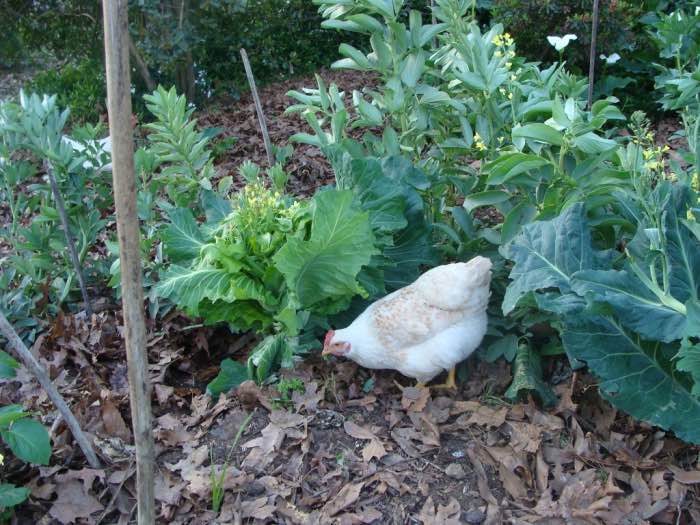
This page was last updated by Bernard Preston on 9th March, 2023.
In this blog I will set out the pros and cons of keeping chickens in the garden. We will talk you through the nitrogen they provide for your plants, the unbelievably bright free-range eggs you can expect and the way your hens will control pests. But really they can also be very destructive.
In the main it's the young emerging seedlings that are particularly vulnerable. Once they have grown to 6" or more they are less attractive to the birds. The exceptions are broccoli, cauliflower and kale; they go delirious over them. We think it is the lutein that gives protection to their eyes; and ours.
But nothing beats a fresh egg for breakfast.
Just look the other way and they will decimate your green beans, shred your broccoli and cauliflower plants. Then they will rip out the spring onion seedlings in search of earthworms and other creatures, both friendly and destructive.
Plus we have some thoughts on
security. The term bird-brain was specifically founded for your hens;
they are incredibly stupid. Without planning, fox, mongoose and crowned
eagles can demolish your flock; and the nightadder too.
Mind you they have a very complex social hierarchy from which our term pecking-order comes, of course. It is reported they can make 60 alternate sounds. For example, if the rooster finds a source of worms, he will call the hens with a very special cheep; but the warning cry that a bird of prey is hovering is quite different.
I love the shrill scream that a sitting hen will make, warning others to keep away. Cuckolding is definitely not allowed.
Above you can see Baby Brown hunting for pests and spreading the mulch. She was my favourite, always accompanying me when I was weeding, making delightful little clucking sounds; more of a pet than simply a fowl. Today she is no more; off with her head, cried the mongoose one night, sucking out her blood and leaving the corpse to shock me.
Her blood was upon my head; the hen house wasn't secure. So, step number one, what are the predators and how are you going to thwart them?
Simple chicken coops can be easily built at minimal cost using wooden pallets.
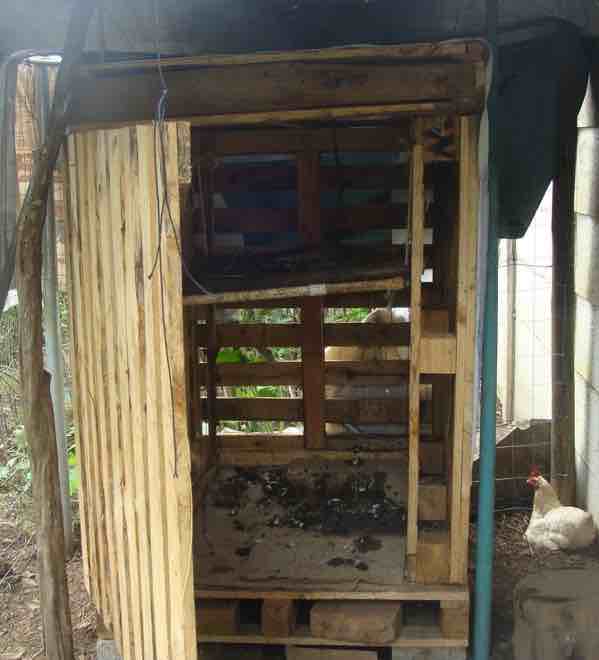
Even so, with a secure hen-house, the aerial foes that descend from the heavenlies on unsuspecting free range chickens are not easy to control.
A cockerel helps. We have had him for three years now; the neighbours have not complained about his crowing.

A very rare and threatened Crowned Eagle took out Snow White. Yes, our hens have names; they are our pride and joy. Once you have christened them you can never eat them, but the raptors are less sensitive to such niceties.
Sadly Crowned Eagles are a diminishing specie whilst there are millions of hens, so I cannot begrudge him the meal; unless you consider these setbacks up front, you may be so disheartened that you give up when you've hardly got started.
Chickens in the garden
It's difficult to rate the value of chickens in the garden; wonderful free range, omega-3 rich eggs may be highest on your bucket list.

For us it was natural pest management. The Mexican bean beetle has devastated our legumes for the last three years; along with chickpeas, they had been the mainstay of our determination to reduce our reliance on red meat for protein. Enter chickens in the garden.
The World Health Organisation is unequivocal on the subject; it is one of the main causes of malignant disease, probably because of modern farming methods; legumes, fish and fowl are the alternative, unless you have access to real organic red meat. It barely exists.
But the best laid plans of mice and men oft go astray; those damn beetles are so destructive. Enter our chickens in the garden one year ago; now we have again had a wonderful crop of green beans with hardly a sign of bug damage; the hens took out the larvae that were skulking in the mulch during the winter.
The chickens break the pest life-cycles, and all the while it reduces our feed costs, as they scratch for tiny larvae, cutworms, grasshoppers, snails and the like.
Currently there is a devastating plague of army worm of Biblical proportions in Southern Africa; I am not sure whether it just has not reached us, but only one cob in the first hundred had very slight signs of damage. Chickens in the garden keep most of the pests under control.
Fly larvae sometimes appear in the worm farms; that is when we dig out the vermicompost and let the hens in for a feast.
Second on my list of the uses of chickens in the garden is the value of the nitrogen their litter provides in the compost heap, and of course all over the patch; it is a sort of guano.
For the pile to flourish one needs a higher ratio of nitrogen to carbon than would normally be readily obtained in your backyard.
So, twice a week the hen house is cleaned out, and the chicken litter is added to the compost pile; then it really takes off. Turn it twice more to let air in and you will have fine humus in a month or two; thick bits like corn stalks may need to be recycled again.
The worms in the compost pile seem to know how to scatter when the temperature soars.
On the negative side, the chickens in the garden will completely eradicate the very beneficial earthworms in your garden, given half a chance. Should they be included on the invasive alien species list?
Our Zulu hens are hardy and make very good brooders, but generally it is recommended you use the dual-purpose birds like Rhode Island Reds, Black Australorps and we have Leghorns.
Point of lay is a good time to buy your chickens; around four months old.
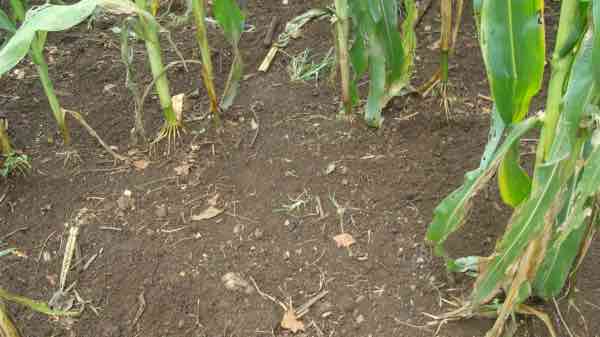
Thirdly, your hens will provide weed control in the garden. They till the ground and save you hours of work; they are omnivores and by scratching they eat a prodigious amount of the undesirable weeds in your garden. Of course, they'll scratch out the boss' seedlings too and shred the broccoli in their desire for greens; more about that later.
For
those who desire to live in long in the land, take note that the WHO
has upped the rating on Roundup, the trade name for the world's most
common herbicide, glyphosate, from a "possible" cause of malignancies to "probable." And finally in April 2018 it is banned throughout the EU. The
honeybees will rejoice as it affects their brains and they cannot find
their way home; Colony Collapse Disease. And almost certainly does the same for ours. Traces are
found in almost all our food, even honey. It destroys the friendly microbes in the gut.
Notice how our chickens in the garden kept the ground meticulously cleared in the corn patch; without them this would be waist high in weeds.
You have three options here.
- Build mobile chicken tractors that allow the hens access to the weeds but not to your seedlings.
- Divide your vegetable garden into camps, or even use a mobile electric fence to keep them out of the kale.
- Allow them into sensitive areas for a short period under strict supervision in the evening. Calling them to dinner they will soon leave your treasured vegetables on the way to the hen house.
In short it all takes some planning; how are you going to let the chickens in the garden forage for the weeds but not destroy your treasured vegetables. Do you have the time to commit to caring for them?
Fourthly, as every organic gardener knows, your vegetables need a healthy amount of humus; and turning the compost pile is hard work. Without plenty of oxygen, an anaerobic process will render your heap ineffective and stinky.
Just let the chickens in the garden into your piles; in search of worms and the teeming microbes, they will be a great help in turning the decomposing refuse, and letting fresh air in; they ferret around the heap for probably half the day, adding yet more litter.
Fifthly, instead of throwing your waste from the kitchen into the garbage, and hence onto the dump, you can feed it directly to the hens; or, you can toss it into a worm farm and then feed the wrigglies to the chickens in the garden.
The race to end waste is a responsibility that rests on the shoulders of each and every one of us.
The dumps are bursting with our trash; what can each one of us do to reduce it?
Interestingly, the hens are very discriminating; they know when food has past its sell-by date. Every week I visit the green grocer and come back with six bags of waste; much of it is rotten and goes straight to the worm farms.
If I am undecided about the rest, the birds will pick out that which is edible and dismiss the rest; they love tiny tomatoes and watermelon, for example but like us they turn up their noses at wilted lettuce.
What might surprise us humans is the attitude of the chickens in the garden to white bread; but our 100% wholemeal loaf drives them absolutely crazy with excitement. In some ways we are the bird brains.
Newsletter
Our newsletter is entitled "create a cyan zone" at your home, preserving both yourself and Mother Earth for future generations; and the family too, of course. We promise not to spam you with daily emails promoting various products. You may get an occasional nudge to buy one of my books.
Here are the back issues.
- Lifestyle and ideal body weight
- What are ultra-processed foods?
- Investing in long-term health
- Diseases from plastic exposure
- Intensive lifestyle management for obesity has limited value
- A world largely devoid of Parkinson's Disease
- The impact of friendly bacteria in the tum on the prevention of cancer
- There's a hole in the bucket
- Everyone is talking about weight loss drugs
- Pull the sweet tooth
- If you suffer from heartburn plant a susu
- Refined maize meal and stunting
- Should agriculture and industry get priority for water and electricity?
- Nature is calling
- Mill your own flour
- Bake your own sourdough bread
- Microplastics from our water
- Alternative types of water storage
- Wear your clothes out
- Comfort foods
- Create a bee-friendly environment
- Go to bed slightly hungry
- Keep bees
- Blue zone folk are religious
- Reduce plastic waste
- Family is important
- What can go in compost?
- Grow broad beans for longevity
- Harvest and store sunshine
- Blue zone exercise
- Harvest and store your rainwater
- Create a cyan zone at your home
Camps
So dividing your area into garden camps, fenced off from each other is perhaps the most effective way to manage chickens in the garden.
Four-foot fences would do, with only an adventurous few flying over into the kale and broccoli, but I chose higher ones; then we can also use them for growing pole beans, gem squash and granadillas too, for example.
Each camp must have a gate, of course, to keep the pesky birds out, or they'll eat you out of house and home; designing and welding up a steel gate out of remnants in the workshop is currently being added; they are expensive to buy and not difficult to make. Steel gate design is now one of the skills I can add to Linked In; see Bernard Preston's new skill.
Another is learning to make a vegetable garden fence; if I can do it, so can you. We put them in originally for plants like pole beans, but it has not been a great success; the lack of crop rotation means they don't do well after a few seasons.
Also they restrict movement around the yard; rather put in a vegetable garden trellis for your climbers.
Can I make a plug for one of these new inverter welding machines? They are light and much easier to use, especially with the automatic darkening helmets; for every workshop.
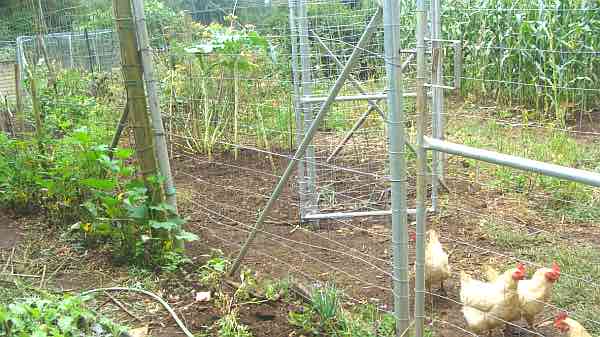
We have three camps at present, with a fourth in the planning; two large ones on the left and right, and one in the centre for seedlings; currently they are encouraged to go into the middle one for a few days to fertilize, clean out any cutworms in the new compost, and spread it all out.
Tomorrow we plant the winter seedlings; 150 dark green vegetable plants are in and there is still space for others. Kale and eggs provide all the lutein and zeaxanthin needed to protect your eyes from cataracts and age-onset macular degeneration; it is the hens' favourite food after worms for the same reason, I suppose. They need excellent vision to find those microbes.
The fourth camp is now complete; it is 600 square-metres so we have plenty of room for expansion. The hens are now kept out of the vegetable garden when they are at a sensitive stage. We sometimes let them in under supervision, a bamboo switch in hand.
A rooster?
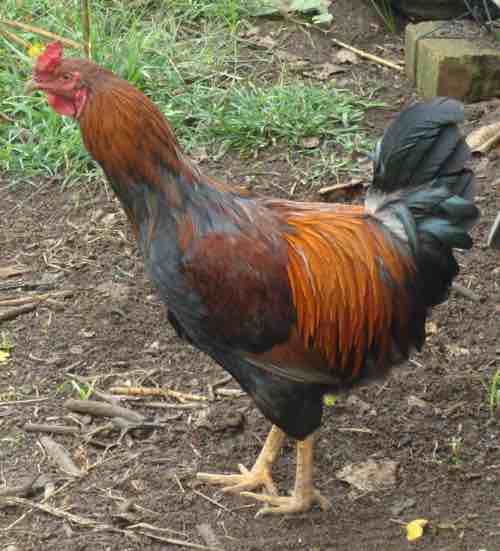
The consensus seems to be that a rooster is more trouble than he's worth; he will wake you up an hour before dawn with his crowing, eat into your profits and supply no real benefit.
So be it; we've decided to go against the majority, and Rhett Butler has come to town and made his way without hesitation to the hen house. But Scarlet and the rest of the hariem are not impressed, and today he has definitely been given the cold shoulder; that is okay.
I am told he is a definite asset to the chickens in the garden when the eagles threaten, so we will see. He is a handsome devil, I must say; it's not obvious in this light but the flecks of cyan and grey are so beautiful.
One hopes the neighbours aren't too upset; I have added another double layer of plastic sheeting at the upper level to mute his voice in the early hours.
That was not too effective but a couple lengths of a discarded runner from the carpet shop did the trick; it is muffled his voice by at least 50%. The neighbours have not complained; yet. We have had him three months now.
Perhaps best of all is in the matter of sex education for the
grandchildren; already there is an understanding that now there could be
chicks; I would rather they discovered the facts of life in this
natural way.
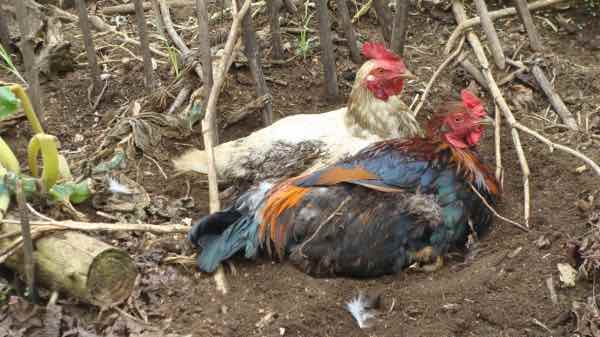
I did not take the ladies' man to get acquainted with the girls! Here they are taking a sand bath; it is their way of dealing with bird lice apparently.
Hens and a rooster kerfuffling of course means a brood of cheeping offspring; then best chick food will be of interest too.
A major rethink is on the go; what are we going to do with the baby cockerels that are hatching. They are waking the neighbourhood long before dawn. The decision has been made; all that is required is how to implement it least unkindly. Roast organic chicken is to be on the menu soon.
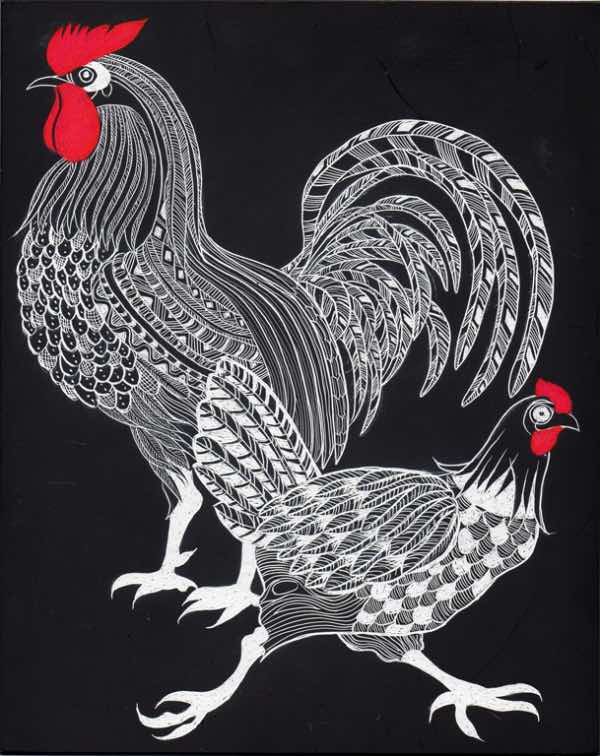
Australorp hen
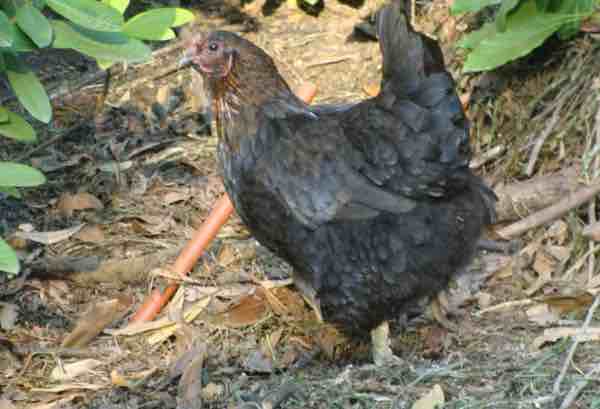
Laying birds do not often get broody but this australorp hen is a known winner; thank you Connie for the beautiful addition to our flock. We have named her Togo.
It will be Spring in a few weeks, so I am busy with a nesting box that will make her secure from the mongoose. Hoping she will find it to her liking.
The grandchildren are keeping back her eggs, rotating them every day, and within two weeks we hope Togo will take to her new duties.
If you plan to breed from the hens you will soon have a surplus of roosters; they make perfect peri peri chicken. Avoid giving them names.
Chicken tractors
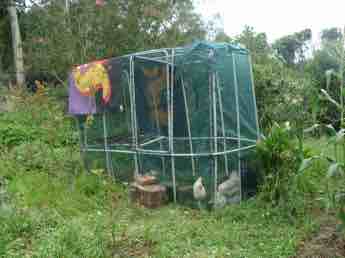
Mobile chicken tractors are useful too but again some planning is necessary.
This chicken tractor design, we'll call it Mark I, was too large and heavy. It is effective, but I cannot get it from one camp to another. Instead, it is used today for raising chicks.
The original idea was that they would live permanently in the chicken tractor but after six months it became apparent that they need a permanent coop.
Mark II will be much lighter and because it does not need to be a safe haven overnight, it can be made of electrical conduit or thin steel rod only; inexpensive, and not heavy.
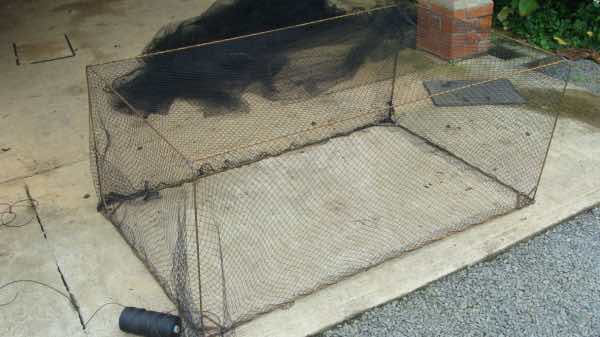
Chicken tractor designs like the one above are very simple to weld up. They keep the hens in or out depending on your need; mostly they are used to protect our sensitive young veggies from the birds.
Free range eggs
Free range, or "proper eggs" as they call them in England are hard to come by. Many times the hens spend no more than half an hour out of the sheds; and are squeezed in at eight per square metre of pasture. If you want to be sure, go to the farm and see for yourself, or keep your own fowls in the garden; only with best chicken feed can you expect these wonderful health properties.
Your hens will need at least 50 g of layer mash per day; if confined then you will have to add double that of corn. Clean water is imperative.
Another of our new innovations, for us anyway, is the use of sprouted corn for chickens; they far prefer the softer seed with its juicy tendrils. Next will be to test fava beans for protein straight from the garden; they are one of our favourite legumes but we have not yet tried them on the hens.
We sought out how to plant broad beans, as they are known in Africa, in effort to prevent Parkinson's disease which is so prevalent in our area, plus we love the organic vegetable protein when they are young; we are hoping the hens love them too. The chickens in the garden, keeping them happy and in fine fettle is a constant challenge. I might say a joyful one that we happily engage in.
Here is an update on that subject; the broad beans are not as easy as shelling peas and is a schlepp to give them to the birds. Wrigglies from the worm farms are the mainstay of their protein.
More difficult is whether we could slaughter and eat the young cockerels; a challenge for the near future. Our first clutch of six chicks are nearly three months old, and Big Brown is sitting on 16 eggs.
Various sites reckon you can work on 4 eggs a week from each hen, but we are averaging 6; I suspect it is the gourmet meals from the worm farms that is making the difference.
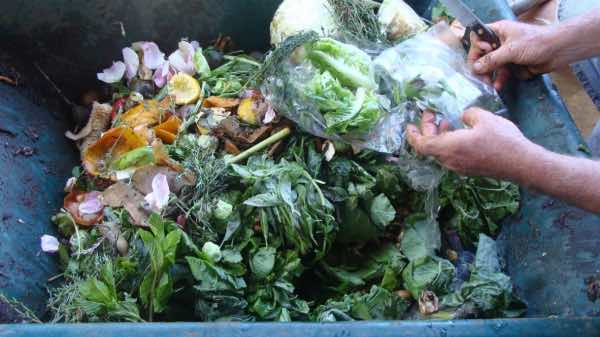
One third of the food grown for humans is never actually consumed; much of it is lost in supermarkets once it has past its sell-by date. The race to end waste is in a sense a movement to save the humankind from starvation and mass food riots.
Second Harvest is part of this philosophy; whatever remains then that is not fit for human consumption can be collected and fed either to the worms or our chickens in the garden that thrive on these greens and old fruit.
Surprisingly despite their excellent diet of purchased laying mash, plus worms and all the greens for them to feed on, we were still getting soft-shelled eggs.
Can you feed eggshells to hens? Yes, sirree, you certainly can, and it has largely solved the problem.
In short, true free range eggs are very high on our priority list for healthy living; they also fit in perfectly with our slow food, made fast philosophy.
Completely contrary to this philosophy, and only if you have plenty of time on your hands, and enjoy low blood cholesterol can you enjoy this disgustingly delicious Hollandaise sauce with your eggs Florentine; a very European dish.
One possible justifications for such an indulgence is that fresh eggs are one of the most wonderful choline food sources.
Whilst it may not be quite as strong in Leghorn hens, the instinct in our wild Zulu hens to make a secret nest and start brooding is very apparent. I have known for several weeks that one of our hens was making mischief and yesterday I found her clutch over the fence in the neighbour's property. Eleven eggs and now unless I am going to let her sit, testing eggs for freshness is paramount.
Should one refrigerate eggs? With your own hens it's not a question that comes up; you simply enjoy them fresh every day.
If you want true free range eggs, yet able to garden without their other pest-like attributes, like scratching out your seedlings, then the ability to make a vegetable garden fence is a must.
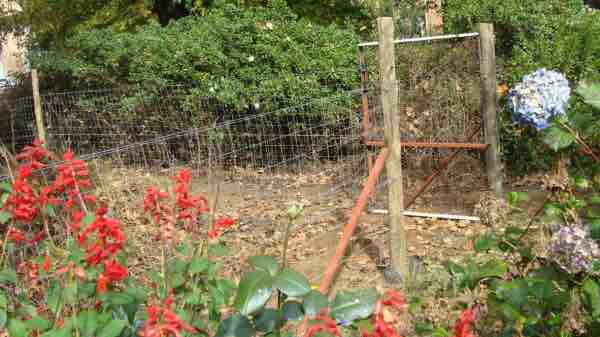
Yet another reason is the insecticide Fipronil; literally tons of eggs in the Netherlands are being returned to producers because of unacceptably high levels of this very toxic poison in eggs. Chickens in the garden and your own free range eggs may just save your life. Google it, if you think this is alarmist fake news.
Chilli chicken recipe
One of the more formidable tasks ahead of you, if you want to have a rooster amongst the chickens in your garden, is using your own free range cockerels for this chilli chicken recipe.
Our recipe for sesame chicken is another favourite. Famous guru, Joel Salatin, talks of the consequences of eating stressed food. As we know ourselves only too well, when we get het up, unpleasant hormones and neurotransmitters are squirted in large doses into our blood streams. Eating a rooster that was enjoying your broccoli ten minutes ago, had sex just a few seconds ago and now has just lost his head is quite different in both taste and nutrition.
Zeaxanthin macular degeneration
Free range eggs and corn are the solution to "zeaxanthin macular degeneration;" don't be one of the two million Americans who are needlessly blind because of a deficiency; you need lutein too. Chickens in the garden have many benefits, not least you will have a lower chance of losing your eyesight in your dotage.
Find the links to those topics highlighted in bold by copying and pasting into the Site Search tab in the main menu above.
And finally should chickens in the garden be considered one of the invasive alien species? They consume a lot of important earthworms in the garden; but they also provide many benefits, like the indigenous ladybird that keeps many other pests under control.
Bernard Preston
Bernard Preston is a semi retired DC with a passion for enjoying nutritious food; proper eggs, as the English call them, from your own chickens in the garden could be part of the deal for your family too.
In Africa you have to guard against the mongoose, or uchakide, and the raptors.
One of the things that I love about our green home is that it has led me into developing new skills that I might never have considered. Like, who needs to learn to weld? Now I think every able-bodied male, and yes women too if it takes their fancy, should have one of these new inverter types; it's so easy. See how I have learned to make a simple steel gate design. It has become necessary to create rotational grazing for our hens; bought fencing materials are expensive.
Did you find this page interesting? How about forwarding it to a friendly book or food junkie? Better still, a social media tick would help.
- Bernard Preston homepage
- Chickens
Address:
56 Groenekloof Rd,
Hilton, KZN
South Africa
Website:
https://www.bernard-preston.com